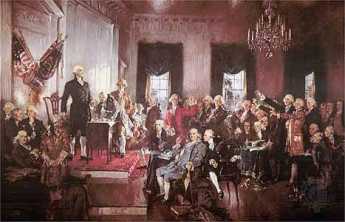Related Topics
No topics are associated with this blog
Massachusetts Makes Something Clear

|
| The Constitutional Convention |
Two small sections, Eight and Nine of Article One, list the separations of state and national sovereignties in very sparing language. The states must be prevented from using their sovereignty to gain the advantage over each other. Defense of the coasts against piracy and a general postal system is a Federal responsibility. As are open borders between the states, both physical and economic, promoting trade to the advantage of everyone. Uniformity of weights and measures, patents and copyrights, currency and coinage, bankruptcy and naturalization rules permit everyone to aspire to wider and easier markets, without loopholes for weasels. Uniform rights unite the various subcultures, so a general prohibition of ex post facto laws and suspension of habeas corpuswas declared, along with degrading the currency, injuring the sanctity of contracts (or by implication injuring all the centuries of legal consensus known as the common law). Everyone knew state legislatures had either ignored or flouted these principles; state interference in these particulars was therefore expressly prohibited. Desirable federal powers were stated in a positive way, and limited to what was stated. However, because there remained doubters even after the Constitution was put into action, the Tenth Amendment was soon added to restate the point:
The powers not delegated to the United States by the Constitution, nor prohibited by it to the States, are reserved to the States respectively, or to the people.
These prohibitions were not put in there because they were theoretically possible. They were there because the sins described had happened many times, and the sinners agreed to them because denial was useless.
There were plenty of other negative ways to put all this, but the Constitution restrained itself. Certain powers were essential for a functioning national government, while some few powers would be destructive if the component states exercised them. The framers might have said but did not say: Look at what has happened among the little countries of Europe; the same thing might also happen to us. As Adam Smith had recently warned, avoid economic discriminations against foreigners which are lumped under the heading of Mercantilism; in other words, avoid the use of government power to favor local businesses against competitors outside the political boundaries who therefore have no local influence. Let several states avoid the expense and nuisance of different coinages, tariffs, licenses, and cartels. The inability to assemble parts of manufactures in different jurisdictions, using different rules and regulations, mainly designed to increase prices for the general mass of consumers for the benefit of a few politically well-placed producers, who should enjoy such advantages only if they earn them. In some ways, these negative arguments had the greatest persuasive force because almost everyone could think of some injury inflicted by similar laws. In 1787 it was only recently that our whole nation had suffered from the mercantile rules of Great Britain, who was supposedly a partner with the colonies. Exhortations with this sort of specificity were excluded from the document. Private publications like the Federalist Papers could be more explicit because they were not official parts of the agreement, and thus could be more easily reshaped by the courts. Those who today confine Original Intent to specifics could be treading on soft ground.
It was hard to know where to stop with these arguments. A promise was being made that the nation would prosper with expansions of scale, and in fact, it soon did. It was also foreseen that expansion of the right of the federal government to tax would automatically constrict the ability of the states to do so, and in time the state legislatures have been reduced to begging for federal funds. [At the same time, it seems unlikely that the Constitutional Convention would have condoned the present discordance between the several states in what federal taxes they pay compared with what federal benefits they receive.] The states' inability to levy troops and declare wars has indeed reduced local power to intervene to block hostilities, not of local concern. There have been occasions to fear that plebiscites for personal freedom may have sometimes impaired the nation's ability to defend itself. Local gasoline and cigarette tax wars occasionally spring up to exploit differences in state taxation, but in general, there remains comparatively little mercantilism at a state level. But regional differences have correspondingly grown, along with the sense of local powerlessness to resist it. The Civil War is only the largest example of a general trend of shifting conflicts into those gaps of jurisdiction unimagined by the framers. Section Eight arguments all rode on the rising tide of the Industrial Revolution; they proved in general to depict correct predictions. But they also persuaded 600,000 young men to die, for or against the Union itself.
Originally published: Saturday, October 13, 2012; most-recently modified: Monday, July 22, 2019